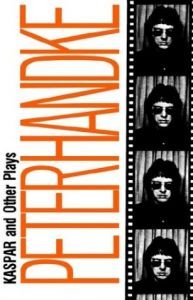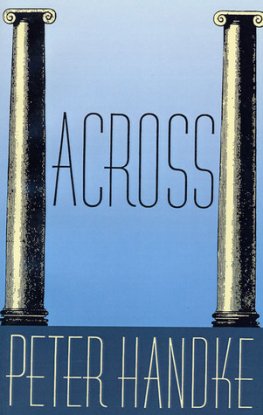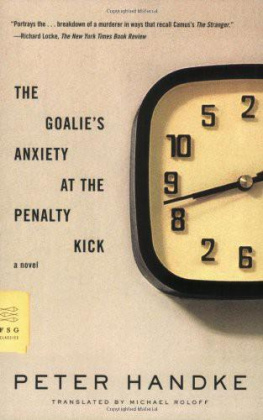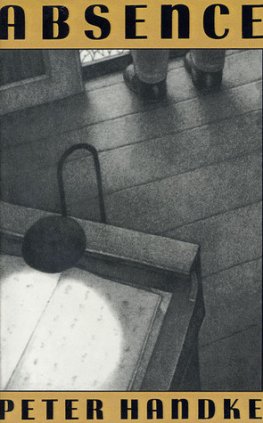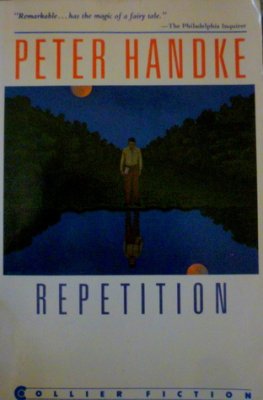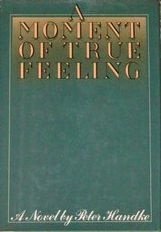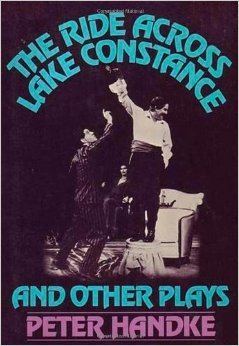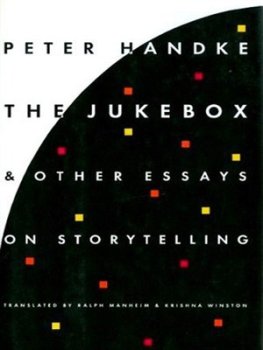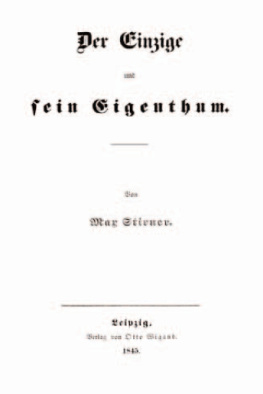Peter Handke - Kaspar and Other Plays
Here you can read online Peter Handke - Kaspar and Other Plays full text of the book (entire story) in english for free. Download pdf and epub, get meaning, cover and reviews about this ebook. year: 1970, publisher: Farrar Straus Giroux, genre: Religion. Description of the work, (preface) as well as reviews are available. Best literature library LitArk.com created for fans of good reading and offers a wide selection of genres:
Romance novel
Science fiction
Adventure
Detective
Science
History
Home and family
Prose
Art
Politics
Computer
Non-fiction
Religion
Business
Children
Humor
Choose a favorite category and find really read worthwhile books. Enjoy immersion in the world of imagination, feel the emotions of the characters or learn something new for yourself, make an fascinating discovery.
- Book:Kaspar and Other Plays
- Author:
- Publisher:Farrar Straus Giroux
- Genre:
- Year:1970
- Rating:4 / 5
- Favourites:Add to favourites
- Your mark:
- 80
- 1
- 2
- 3
- 4
- 5
Kaspar and Other Plays: summary, description and annotation
We offer to read an annotation, description, summary or preface (depends on what the author of the book "Kaspar and Other Plays" wrote himself). If you haven't found the necessary information about the book — write in the comments, we will try to find it.
Kaspar and Other Plays — read online for free the complete book (whole text) full work
Below is the text of the book, divided by pages. System saving the place of the last page read, allows you to conveniently read the book "Kaspar and Other Plays" online for free, without having to search again every time where you left off. Put a bookmark, and you can go to the page where you finished reading at any time.
Font size:
Interval:
Bookmark:
Peter Handke
Kaspar and Other Plays
OFFENDING THE AUDIENCE
for Karlheinz Braun, Claus Peymann, Basch
Peymann, Wolfgang Wiens, Peter Steinbach,
Michael Gruner, Ulrich Hass, Claus Dieter Reents,
Rdiger Vogler, John Lennon
Rules for the actors
Listen to the litanies in the Catholic churches.
Listen to football teams being cheered on and booed.
Listen to the rhythmic chanting at demonstrations.
Listen to the wheels of a bicycle upturned on its seat spinning until the spokes have come to rest and watch the spokes until they have reached their resting point.
Listen to the gradually increasing noise a concrete mixer makes after the motor has been started.
Listen to debaters cutting each other off.
Listen to Tell Me by the Rolling Stones.
Listen to the simultaneous arrival and departure of trains.
Listen to the hit parade on Radio Luxembourg.
Listen in on the simultaneous interpreters at the United Nations.
Listen to the dialogue between the gangster (Lee J. Cobb) and the pretty girl in The Trap, when the girl asks the gangster how many more people he intends to kill; whereupon the gangster asks, as he leans back, How many are left? and watch the gangster as he says it.
See the Beatles movies.
In A Hard Days Night watch Ringos smile at the moment when, after having been teased by the others, he sits down at his drums and begins to play.
Watch Gary Coopers face in The Man From the West. In the same movie watch the death of the mute as he runs down the deserted street of the lifeless town with a bullet in him, hopping and jumping and emitting those shrill screams.
Watch monkeys aping people and llamas spitting in the zoo.
Watch the behavior of bums and idlers as they amble on the street and play the machines in the penny arcades.
When the theatergoers enter the room into which they are meant to go, they are greeted by the usual pre-performance atmosphere. One might let them hear noises from behind the curtain, noises that make believe that scenery is being shifted about. For example, a table is dragged across the stage, or several chairs are noisily set up and then removed. One might let the spectators in the first few rows hear directions whispered by make-believe stage managers and the whispered interchanges between make-believe stagehands behind the curtain. Or, even better, use tape recordings of other performances in which, before the curtain rises, objects are really shifted about. These noises should be amplified to make them more audible, and perhaps should be stylized and arranged so as to produce their own order and uniformity.
The usual theater atmosphere should prevail. The ushers should be more assiduous than usual, even more formal and ceremonious, should subdue their usual whispering with even more style, so that their behavior becomes infectious. The programs should be elegant. The buzzer signals should not be forgotten; the signals are repeated at successively briefer intervals. The gradual dimming of the lights should be even more gradual if possible; perhaps the lights can be dimmed in successive stages. As the ushers proceed to close the doors, their gestures should become particularly solemn and noticeable. Yet, they are only ushers. Their actions should not appear symbolic. Late-comers should not be admitted. Inappropriately dressed ticket holders should not be admitted. The concept of what is sartorially inappropriate should be strictly applied. None of the spectators should call attention to himself or offend the eye by his attire. The men should be dressed in dark jackets, with white shirts and inconspicuous ties. The women should shun bright colors.
There is no standing-room. Once the doors are closed and the lights dim, it gradually becomes quiet behind the curtain too. The silence behind the curtain and the silence in the auditorium are alike. The spectators stare a while longer at the almost imperceptibly fluttering curtain, which may perhaps billow once or twice as though someone had hurriedly crossed the stage. Then the curtain grows still. There is a short pause. The curtain slowly parts, allowing an unobstructed view. Once the stage is completely open to view, the four speakers step forward from upstage. Nothing impedes their progress. The stage is empty. As they walk forward noncommittally, dressed casually, it becomes light on stage as well as in the audience. The light on stage and in the auditorium is of the same intensity as at the end of a performance and there is no glare to hurt the eyes. The stage and the auditorium remain lighted throughout the performance. Even as they approach, the speakers dont look at the audience. They dont direct the words they are speaking at the audience. Under no circumstance should the audience get the impression that the words are directed at them. As far as the speakers are concerned, the audience does not yet exist. As they approach, they move their lips. Gradually their words become intelligible and finally they become loud. The invectives they deliver overlap one another. The speakers speak pell-mell. They pick up each others words. They take words out of each others mouths. They speak in unison, each uttering different words. They repeat. They grow louder. They scream. They pass rehearsed words from mouth to mouth. Finally, they rehearse one word in unison. The words they use in this prologue are the following (their order is immaterial): You chuckleheads, you small-timers, you nervous nellies, you fuddy-duddies, you windbags, you sitting ducks, you milquetoasts. The speakers should strive for a certain acoustic uniformity. However, except for the acoustic pattern, no other picture should be produced. The invectives are not directed at anyone in particular. The manner of their delivery should not induce a meaning. The speakers reach the front of the stage before they finish rehearsing their invectives. They stand at ease but form a sort of pattern. They are not completely fixed in their positions but move according to the movement which the words they speak lend them. They now look at the public, but at no one person in particular. They are silent for a while. They collect themselves. Then they begin to speak. The order in which they speak is immaterial. The speakers have roughly the same amount of work to do.
You are welcome.
This piece is a prologue.
You will hear nothing you have not heard here before.
You will see nothing you have not seen here before.
You will see nothing of what you have always seen here.
You will hear nothing of what you have always heard here.
You will hear what you usually see.
You will hear what you usually dont see.
You will see no spectacle.
Your curiosity will not be satisfied.
You will see no play.
There will be no playing here tonight.
You will see a spectacle without pictures.
You expected something.
You expected something else perhaps.
You expected objects.
You expected no objects.
You expected an atmosphere.
You expected a different world.
You expected no different world.
In any case, you expected something.
It may be the case that you expected what you are hearing now.
But even in that case you expected something different.
You are sitting in rows. You form a pattern. You are sitting in a certain order. You are facing in a certain direction. You are sitting equidistant from one another. You are an audience. You form a unit. You are auditors and spectators in an auditorium. Your thoughts are free. You can still make up your own mind. You see us speaking and you hear us speaking. You are beginning to breathe in one and the same rhythm. You are beginning to breathe in one and the same rhythm in which we are speaking. You are breathing the way we are speaking. We and you gradually form a unit.
Font size:
Interval:
Bookmark:
Similar books «Kaspar and Other Plays»
Look at similar books to Kaspar and Other Plays. We have selected literature similar in name and meaning in the hope of providing readers with more options to find new, interesting, not yet read works.
Discussion, reviews of the book Kaspar and Other Plays and just readers' own opinions. Leave your comments, write what you think about the work, its meaning or the main characters. Specify what exactly you liked and what you didn't like, and why you think so.

